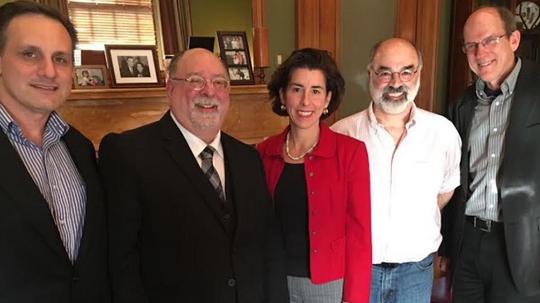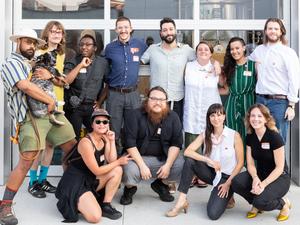
When the global pharmaceutical company Lundbeck shuttered its New Jersey office and consolidated its research back to Copenhagen in Denmark, then Lundbeck employees Dr. Stevin Zorn, Dr. Robert Nelson and Dr. Brian Campbell didn’t want to see their research die.
The three had started the neuroinflammation drug discovery department at Lundbeck and believed they were onto new research that could cure diseases such as Alzheimer's and Huntington’s.
While no one knew it at the time, the split from Lundbeck turned out to be a blessing for the neuroscience community in Rhode Island.
The three former Lundbeck employees teamed up with Dr. Frank Menniti in June 2016 to found MindImmune, a company at the forefront in recognizing the therapeutic opportunities in targeting the immune system to treat brain disease.
Furthermore, the company would find a home at the University of Rhode Island’s George & Anne Ryan Institute for Neuroscience, where leaded are developing an innovation campus that is spawning new startups focusing on neuroscience.
“The stars aligned,” Zorn, president and CEO of the company, told Rhode Island Inno. “With all of the research going on at Rhode Island institutions, we thought Rhode Island would be great place to build our company.”
The four MindImmune founders bring a combined 105 years of pharmaceutical experience from working at big companies like Pfizer to launching entrepreneurial ventures.
Zorn said the company differs from others in the pharmaceutical industry by taking a more holistic approach.
“We are all working together to advance neuroscience with an applied focus on stopping disease.”
For instance, many players are trying to cure Alzheimer’s disease by reducing or eliminating the beta-amyloid proteins that build up into plaques, blocking cell-to-cell signaling at synapses.
Zorn said that time and time again, these efforts have been unsuccessful. Thus, the MindImmune strategy is a bit different: looking at the immune system and and the cause of diseases such as Alzheimer’s.
“Neuroinflammation is at the core of these diseases; it could be causative based on recent genetics research,” he said. “If you don’t stop neuroinflammation from occurring, there may be little opportunity to make significant inroads in modifying the disease process.”
Zorn said the biology behind MindImmune’s approach is akin to cancer biology. But unlike cancer research, which has made significant progress in the last 30 years, the progress with research on diseases such as Alzheimer’s has not come nearly as far, despite the enormity of the problem.
According to the Alzheimer’s Association in 2017, Alzheimer’s was the sixth-leading cause of death and more than five million Americans were living with the disease, a number projected to more than triple by 2050.
In 2017, Alzheimer’s and other dementias will cost the nation $250 billion, and by 2050 the costs could get as high as $1.5 trillion.
Alzheimer’s disease kills more people than breast and prostate cancers combined. Since 2000, deaths from heart diseases have dropped by 14 percent, while deaths from Alzheimer’s have increased by 89 percent.
Despite the 35 million people worldwide suffering from Alzheimer’s disease today, there has been no new drugs approved since 2004.
Zorn could not specifically speak about the novel solutions MindImmune is developing due to their proprietary nature.
But, he did say that the company has garnered attention for its work. Zorn named receiving private seed funding from Slater Technology Fund as well as other investors; earning an innovation voucher from the Rhode Island Commerce Corporation and collaborating with Pfizer as some of MindImmune's most recent accomplishments.
The company is now looking to raise a series A round starting later this year.
While a daunting task ahead, Zorn has been extremely pleased with the collaboration in the neuroscience community in Rhode Island, and is helping other neuroscience-related startups emerge at the university.
“All the way up to the governor, we are getting tremendous support to do neuroscience research in the state,” he said. “We are all working together to advance neuroscience with an applied focus on stopping disease.”
Editor’s Note: MindImmune was a 50 on Fire 2018 Inno Blazer in the health/wellness category. Read all about the awards here.








